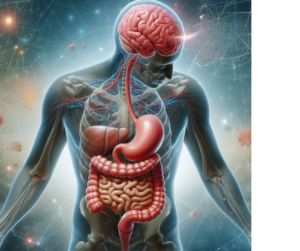A variety of stomach and gut health issues can significantly disrupt the digestive system, leading to pain and discomfort that detracts from overall quality of life. Common conditions affecting gut health include irritable bowel syndrome, gastroesophageal reflux disease, peptic ulcers, inflammatory bowel disease, coeliac disease, diverticulitis, and gallstones.
Table of Contents
ToggleUnderstanding Irritable Bowel Syndrome (IBS) and Its Impact
Irritable bowel syndrome (IBS) is a chronic digestive condition that manifests through symptoms such as abdominal pain, bloating, and changes in bowel habits, including both diarrhoea and constipation. The triggers for IBS can be multifactorial and may include genetic predispositions, dietary choices, previous gastrointestinal infections, inflammation of the gut lining, the presence of a leaky gut, and an imbalance of gut bacteria, particularly an overgrowth of pathogenic bacteria. Understanding these triggers is crucial for effective management and treatment of IBS.
Exploring Gastroesophageal Reflux Disease: Causes and Symptoms
Gastroesophageal reflux disease (GERD) is a chronic condition characterized by the regular backflow of stomach acid into the esophagus, resulting in discomforting symptoms like heartburn, regurgitation, and chest pain. If GERD is not effectively managed, it can lead to serious complications, including inflammation of the esophagus known as Barrett’s esophagus, which may increase the risk of esophageal cancer. The underlying cause of GERD is often related to a weakened lower esophageal sphincter. This can occur due to various factors, including improper stomach emptying, a hiatus hernia, and lifestyle choices such as being overweight or consuming certain foods and drinks, including citrus, spicy dishes, and high-fat meals.
Certain lifestyle factors can contribute to the weakening of the sphincter, including obesity, smoking, and the consumption of certain foods and beverages, such as citrus fruits, spicy foods, and high-fat meals, as well as medications like non-steroidal anti-inflammatory drugs (NSAIDs).
For effective management of GERD, lifestyle modifications, dietary adjustments, and potentially medication are crucial steps to mitigate symptoms and prevent complications.
Identifying Peptic Ulcers: Symptoms and Causes
Peptic ulcers are painful sores that develop in the lining of the stomach, esophagus, or small intestine. Common symptoms include abdominal pain, bloating, nausea, vomiting, and unintended weight loss. The primary culprits behind peptic ulcers are infections—particularly those caused by Helicobacter pylori—alongside prolonged use of nonsteroidal anti-inflammatory drugs (NSAIDs), excessive stomach acid production, and a compromised mucus barrier protecting the digestive tract. Additionally, lifestyle factors like smoking and excessive alcohol consumption can exacerbate these ulcers, leading to significant discomfort and health complications.
Understanding Inflammatory Bowel Disease: Symptoms and Risks
Inflammatory bowel disease (IBD) is characterized by chronic inflammation of the digestive tract, and it encompasses conditions like Crohn’s disease and ulcerative colitis. Symptoms may include persistent abdominal pain, diarrhoea, unintentional weight loss, and chronic fatigue. This debilitating condition often has a genetic component, as individuals with a family history of autoimmune disorders are at greater risk. While there is currently no cure for IBD, its management is essential due to the associated increased risk of bowel cancer. As with irritable bowel syndrome, IBD can severely impact quality of life. Furthermore, the inflammation of the gut lining may compromise the protective mucus layer, leading to increased permeability that allows toxins and bacteria to enter the bloodstream. This can result in systemic issues, including pain and infections throughout the body.
Coeliac Disease: Symptoms and Dietary Implications
Coeliac disease is an autoimmune disorder triggered by the ingestion of gluten, which is a protein found in wheat, barley, and rye. This condition can severely damage the lining of the gut, leading to malabsorption of nutrients and various digestive issues such as foul-smelling diarrhoea, bloating, gas, indigestion, and constipation, all of which can cause significant abdominal discomfort. Individuals with a family history of coeliac disease or other autoimmune disorders are particularly at risk for developing this condition. It is essential for those diagnosed with coeliac disease to adhere to a strict gluten-free diet to manage symptoms and prevent complications.
Understanding the implications of coeliac disease on dietary choices is crucial for maintaining gut health and overall well-being.
Diverticulitis: Understanding Symptoms and Risk Factors
Diverticulitis occurs when small pouches, known as diverticula, form in the walls of the large intestine and become inflamed or infected. Symptoms often include abdominal bloating and pain, particularly in the lower abdomen. Individuals experiencing severe abdominal pain, fever, or persistent diarrhoea should seek medical attention promptly, as these could be signs of a more serious condition. A primary contributing factor to the development of diverticulitis is a diet low in fiber, particularly one high in processed foods. Other risk factors include obesity, sedentary lifestyle, and smoking.
Gallstones: Causes, Symptoms, and Risk Factors Explained
Gallstones are hardened deposits that form in the gallbladder, leading to intense pain in the upper abdomen. These stones can vary in size, from small grains to larger formations, and may cause additional symptoms such as nausea and vomiting. Risk factors for developing gallstones include being over 40 years of age, being female, obesity, diabetes, and a family history of gallstones. Furthermore, a diet low in fiber and high in processed foods can significantly heighten the risk of gallstone formation.
Effective Strategies for Preventing Common Gut and Stomach Problems

The digestive tract is often referred to as the “second brain” due to its intricate network of nerves called the enteric nervous system. This system contains more neurons than the spinal cord and includes the vagus nerve, which establishes a connection between the gut and the brain. Interestingly, there are more signals sent from the gut to the brain than vice versa, a phenomenon known as the gut-brain axis. This connection can influence our emotions, which is why we often
Post navigation
Previous Post
9 Comments
Comments are closed

It’s interesting to note how mental health can also intertwine with IBS—a connection often overlooked in the digestive health conversation. Stress and anxiety can exacerbate IBS symptoms, creating a challenging cycle. I’ve personally found that incorporating mindfulness practices, such as meditation, has helped manage my gut health alongside dietary adjustments.
I appreciate you sharing your experience. The link between mental health and IBS is definitely a nuanced topic that doesn’t get enough attention. Stress can sneak in and mess with our digestive system, making things feel even more complicated. It sounds like your mindfulness practices are making a real difference, which is great to hear.
Absolutely, the mind-gut connection is a crucial aspect of managing IBS. If you’re interested in exploring more about how mindfulness and nutrition can work together for better gut health, check out this resource!
https://mannland5.com/quillbot
It truly is fascinating how intertwined mental health and IBS can be. I’ve noticed people often focus on food and digestion without considering the emotional aspect. Stress can have such a powerful impact on our bodies, and it creates this feedback loop that can be tough to break.
You’re really hitting the nail on the head with that observation. It’s surprising how often the emotional aspects get sidelined in discussions about IBS, while they can play such a crucial role. I remember reading a study that highlighted how stress can exacerbate gastrointestinal issues. It makes sense, considering our bodies are all interconnected in ways that are easy to overlook.
It’s interesting how the emotional aspects of conditions like IBS often get pushed to the background, isn’t it? I’ve noticed that many people wait until they’re physically experiencing symptoms to seek help, when in reality, addressing stress and emotional health can be so pivotal. I read a similar study that found a significant link between anxiety levels and IBS flare-ups, which really reinforces that interconnectedness you mentioned.
It’s interesting to see how much focus is placed on the physical aspects of IBS—like food choices and gut health—while the emotional side often takes a backseat. You’re spot on about the feedback loop that forms between stress and our digestive systems. Many people don’t realize that our brains and guts are closely linked, sometimes referred to as the gut-brain axis. This connection can influence everything from our digestion to our overall mental well-being.
Absolutely, the connection between our minds and bodies is so profound! If you’re interested in exploring ways to manage both mental health and IBS, check out this helpful resource that offers insights and strategies.
https://mannland5.com/quillbot
It’s so important to highlight the often-overlooked impact of gut health on our daily lives. Having experienced IBS myself, I can vouch for how multifaceted the triggers can be. For me, stress played a huge role alongside dietary choices, which sometimes makes it feel like an uphill battle. It’s fascinating how interconnected our mental well-being and gut health are; I’ve found that mindfulness and stress management techniques have helped alleviate some symptoms. Have others here noticed similar connections? It would be interesting to hear about different approaches people have taken in managing their gut health, especially when it comes to dietary changes or stress management.
I definitely relate to what you’re saying about the connection between gut health and overall well-being. It’s such a nuanced issue, and for many of us, it often feels like a jigsaw puzzle that’s hard to piece together. Different triggers can overlap in surprising ways. Stress has a sneaky way of exacerbating issues, and sometimes it seems like food choices are impacted by our mental state—if you’re stressed, that can lead to cravings for comfort food, which may not always be the best choice for our guts.
You bring up some great points about the connection between gut health and stress. It really is a complex web, isn’t it? Your experience with IBS highlights how individual triggers can vary. Stress can be such a sneaky factor, amplifying physical symptoms while also affecting our overall mindset.
“Thank you for sharing your experience! It’s inspiring to see how mindfulness has positively impacted your journey. If you’re interested in exploring more about the connection between gut health and overall well-being, check out this insightful resource that dives deeper into dietary changes and stress management techniques.”
https://mannland5.com/quillbot